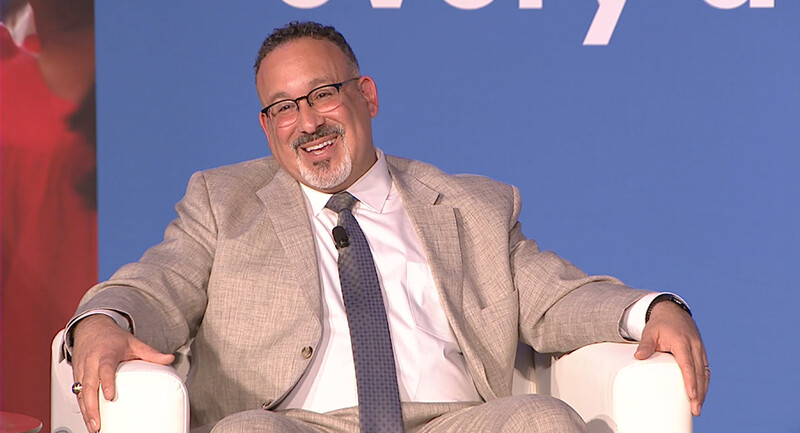A recent Phi Delta Kappan poll found that more than 60 percent of parents do not want their children to become teachers. Among the reasons, respondents cited low pay (29 percent); the difficulties and stress of the job (26 percent); and a lack of respect or being valued (23 percent). Take just a few minutes on #TeacherTwitter—with its flood of posts and retweets from teachers proclaiming, “I’ve had it!”—and the distress experienced by those in the teaching profession becomes vividly clear.
The challenges of the past few years have fundamentally changed us all—students, teachers, parents, and administrators. For teachers, these challenges are compounded by ongoing issues like low salaries, long days, and out-of-pocket spending, which are reflective of a lack of respect for the teaching profession.
In a recent interview with The Atlantic, U.S. Secretary of Education Miguel Cardona put it bluntly: “We have normalized treating the profession as less than what it should be and we have seen the results of that. When [teachers] have options, they say, ‘I am not doing this.’ And we have to do better.”
The grim narrative is not only hurting teachers who are in the classroom but also deterring those who might consider becoming teachers. Building respect for the profession requires collective effort as a society; it’s not the job of teachers to make it happen. Policies need to be enacted that provide better compensation, opportunities for professional growth, and greater teacher autonomy in choosing what and how to teach. And yet, despite the many deterrents, we in the profession know that hundreds of thousands of teachers are showing up every day to nurture hearts and minds. Where are their stories?
The Trap of Fatalism
We can’t build respect for the teaching profession simply by pointing out how teaching is broken. Research from The FrameWorks Institute, an organization that “applies social science methods to study how people understand social issues—and how best to frame them,” shows that perpetual crisis framing actually works against creating positive change.
In the article “Don’t Feed Fatalism…Put Forward Solutions Instead,” FrameWorks explains: “Painting too vivid a picture of impending doom typically leads to one of two things. People either dismiss the claim outright or conclude that tragedy is inevitable no matter what we do. This is fatalism in a nutshell: the assumption that problems are insurmountable and that change efforts are bound to fail.”
In order to spark change, we need to amplify stories of why teachers teach.
If spotlighting the severity of issues can result in a fatalistic frame of mind, then what’s an alternative? How might encouraging educators to talk up the positive aspects of their profession create a shift in perceptions about what teachers do? This is not to say we should ignore or downplay the very real challenges teachers face but that we should aim to give a fuller, more multifaceted portrayal of teachers’ experiences. In order to spark change, we need to amplify stories of why teachers teach.
Hearing from Teachers Firsthand
Center for Inspired Teaching, the organization I founded and continue to lead as president, engages with thousands of educators from across the country every week through our professional development programming, digital tools, and weekly resource, Hooray For Monday. In a recent issue of Hooray For Monday, we asked educators the question, “Why do you teach?”
Teachers’ answers offer powerful reminders of why the teaching profession deserves respect:
“Being able to teach is rewarding. Children are influenced by what they see and who they are around. Not only am I teaching them academics, but also manners, sportsmanship, and self-worth. These are important factors that children need in everyday life.”
“I love learning from today's youth and younger colleagues. They are growing up in a very different world than I knew as a young professional and certainly as a young student myself. Every day each of them and their materials teach me something new.”
“I teach because I can’t stop myself [from] being in a place where I can do something, and I know that will make a difference!”
“I teach to change lives, to give my students a voice, to transform our society. I teach because I believe in our children and want to equip them with critical thinking skills to forge ahead into an uncertain future.”
"I teach to help save the world. Civics is the most important subject to enable young people to understand society. I learn each day with my students and enjoy seeing them discover ways of improving our world."
We must . . . emphasize the essential role teachers play in sustaining our country through their work.
We must not ignore the reality that teaching is incredibly challenging—especially right now. But alongside that narrative, we must also emphasize the essential role teachers play in sustaining our country through their work. Teachers are tasked not only with educating our children—teaching them the information and skills they will need to thrive in our ever-changing world—but helping them develop as citizens. Teachers are expected to provide guidance and socialization on top of excellent instruction in all academic subjects.
Reframing the Problem
The same FrameWorks article referenced above states, “Crisis framing has, over time, caused a decline in public engagement and eroded people’s confidence in our civic and social institutions. As a result, the greatest communications task for most advocates these days is not to convince people that a problem exists; it’s to convince them that it can be solved.”
What might be possible if we balance all the stories about why teachers are leaving with an exploration of why so many stay? Might we build more respect for the profession when we elevate stories of the important work teachers are doing to help society bounce back from a pandemic?
It’s an experiment worth trying, one Inspired Teaching is doing its part in undertaking, and one we hope you’ll consider tackling as well, even if the algorithms prefer a rant over an explanation. Our country needs its teachers. And it’s our collective responsibility, as a society, to find ways to help them thrive.








